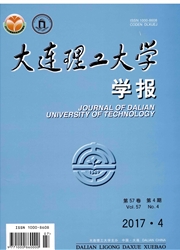

 中文摘要:
中文摘要:
给出了一个不删词的命名游戏模型.说话者根据自身词库中词的使用频数,以频数多被选的可能性大作为选词规则;听者将听到的词与自身词库中的词对照,若词库中已有该词,则将该词的使用频数增加,否则将所听到的词加到自身词库中.模型研究表明,每个个体的使用频数在前三位的词中,至少有一个词是所有个体共有的,并且排名前三位的其他词也是使用频数较高的,这为现实中国一个事物一般有大家接受的命名且往往有不同命名的现象提供了一种形成机制.在此基础上,讨论了收敛时间问题.
 英文摘要:
英文摘要:
A new naming game model is presented,which does not include a deleting-word process. In this model,a word is selected out by one speaker with independent possibility according to the use frequencies in the speaker′s dictionary.Then,the listener compares the given word with words in his own dictionary.If the word already exists in the dictionary,then the use frequency of the word is increased.If not,the word is added in his dictionary as a new item.The model′s experimental results show that there′s at least one word in the first 3high-frequency words of the individual′s dictionary, which is shared by all the other dictionaries.Also,an individual′s first 3high-frequency words always own high-frequencies in other dictionaries.The study could provide a formation mechanism to explain why an object would have name acceptable for all persons and probably have different names.Based on this research,the convergence of time in this model is also discussed.
 同期刊论文项目
同期刊论文项目
 同项目期刊论文
同项目期刊论文
 期刊信息
期刊信息
